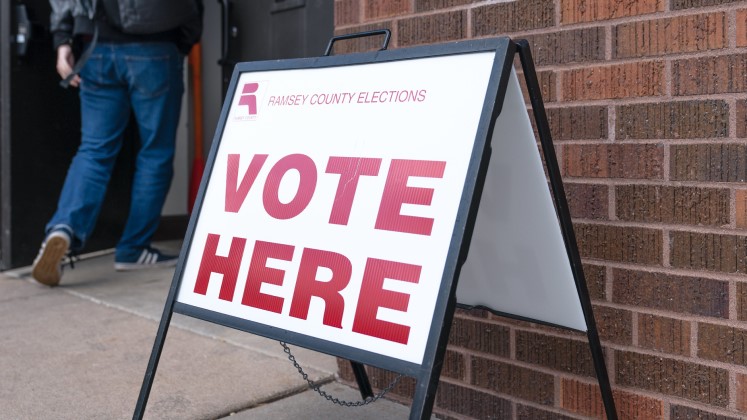This year, we published more than 380 articles covering the entire range of United States politics, policy, and society. Here’s a count-down of our ten most popular articles from this year:
10. Why declaring a national emergency to build a border wall could set Donald Trump on the road to impeachment
 Although some critics have floated the idea of impeaching Donald Trump, Democratic leadership in the House of Representatives has so far muted such calls. Some analysis, however, suggests that if Trump declares a national emergency to build a border wall with Mexico, it would constitute an impeachable offense. Thomas Gift examines how conversations over impeachment could change if Trump issues an emergency declaration. He argues that while Democrats would still be reluctant to pursue impeachment, it could make impeachment more likely in the future depending on the outcome of other investigations, including the Mueller probe.
Although some critics have floated the idea of impeaching Donald Trump, Democratic leadership in the House of Representatives has so far muted such calls. Some analysis, however, suggests that if Trump declares a national emergency to build a border wall with Mexico, it would constitute an impeachable offense. Thomas Gift examines how conversations over impeachment could change if Trump issues an emergency declaration. He argues that while Democrats would still be reluctant to pursue impeachment, it could make impeachment more likely in the future depending on the outcome of other investigations, including the Mueller probe.
9. Primary Primers: Why Super Tuesday will be the most important date in the 2020 election calendar
On March 3rd, 2020, 14 states will hold primary elections to determine their preferred presidential candidates. Barbara Norrander writes that these contests – which will select 34 percent of the Democrats’ convention delegates – will be the one of the most important days of the primary election calendar, and may mark the beginning of the end of the 2020 nomination fight.
8. New US airstrikes obscure a dramatic development in the Afghan drugs industry – the proliferation of low cost methamphetamine
Earlier this month US and Afghan forces bombed 68 drugs labs in South-western Afghanistan, claiming that they caused the Taliban losses of over $1 million per day. David Mansfield and Alexander Soderholm write that not only have the effects of these strikes been exaggerated, their promotion obscures a new reality on the ground: a dramatic growth in the methamphetamine industry in Afghanistan, fuelled by a ready supply of a home grown ephedra crop.
7. Studying how law and order issues are framed has helped to uncover 2016’s shy Trump voters


 In the 2016 election, Donald Trump appealed to many white voters’ concerns about crime through dog whistle rhetoric. Did Trump’s use of this racist rhetoric mean that many of those who did vote for him were unwilling to admit their support in the lead up to the election? In new research, Kevin H. Wozniak, Brian R. Calfano, and Kevin M. Drakulich primed survey respondents with different images relating to policing. They find that that whites exposed to such images were more likely to state their preferred candidate, with more Independent whites revealing a preference for Trump when shown stop and frisk imagery. These results indicate, they write, that media framing of policing in the lead up to the 2016 election may have influenced voters, even if they were unwilling to share these preferences with pollsters.
In the 2016 election, Donald Trump appealed to many white voters’ concerns about crime through dog whistle rhetoric. Did Trump’s use of this racist rhetoric mean that many of those who did vote for him were unwilling to admit their support in the lead up to the election? In new research, Kevin H. Wozniak, Brian R. Calfano, and Kevin M. Drakulich primed survey respondents with different images relating to policing. They find that that whites exposed to such images were more likely to state their preferred candidate, with more Independent whites revealing a preference for Trump when shown stop and frisk imagery. These results indicate, they write, that media framing of policing in the lead up to the 2016 election may have influenced voters, even if they were unwilling to share these preferences with pollsters.
6. Why your sprawling, low-density suburb may be costing your local government money
Despite its desirability to many, suburbs cost, and not only to residents in terms of more expensive transport costs, but also to local authorities, according to new research from Christopher Goodman. By studying 30 years of data covering public spending on metropolitan counties, he finds that compact developments are less costly in terms of public services, while denser developments cost more. Spreading development out, he argues, drives up the cost of providing services, despite fewer being needed to service a relatively smaller population.
5. Interest groups’ influence on policy comes through the presence of faithful legislative allies – not gifts to their campaigns.
4. A new tool can help us determine which conspiracy theories are false and which might be true.
Many or even most conspiracy theories are demonstrably false. But some, like Watergate, are true. How can we determine which are which? Drawing on his own experiences with conspiracy theorists, Stephan Lewandowsky writes that conspiratorial thinking is not necessarily truth-seeking behavior, but can often be a near-self destructive form of skepticism. We can use this skepticism, along with conspiracists’ tendency towards pattern-seeking and self-sealing reasoning, to flush out which are false, and which might be true after all.
3. The curse of slavery has left an intergenerational legacy of trauma and poor health for African Americans
African Americans experience much higher rates of poverty, unemployment, and negative health outcomes compared to Whites in the US. Michael J Halloran writes that the intergenerational cultural trauma caused by 300 years of slavery – alongside poor economic circumstances and social prejudice – has led to the poor state of physical, psychological and social health among African Americans.
2. Obama’s legacy is as a disappointingly conventional president
 More than a decade on from his historic election victory to become the first African American president, to many, in light of President Trump’s election, Barack Obama is the epitome of what a president should be. David Wise writes that despite the 44th president’s electoral successes, President Obama stumbled in areas many Progressives hold dear, such as continuing drone strikes, not taking the big banks to task following the 2008 financial crash, and by failing to consolidate his electoral coalition before pushing his signature Obamacare reform.
More than a decade on from his historic election victory to become the first African American president, to many, in light of President Trump’s election, Barack Obama is the epitome of what a president should be. David Wise writes that despite the 44th president’s electoral successes, President Obama stumbled in areas many Progressives hold dear, such as continuing drone strikes, not taking the big banks to task following the 2008 financial crash, and by failing to consolidate his electoral coalition before pushing his signature Obamacare reform.
Barely a day goes by without President Trump firing off an angry tweet referring to the ‘fake news’ media. But what do we know about actual political bias in the media? Eric Merkley studied 400,000 news stories published over three decades and has found that the tone of economic news is more favorable during Democratic presidencies compared to Republican administrations.
Featured image: “Ten” by César Astudillo is licensed under CC BY NC 2.0
Shortened url for this article: http://bit.ly/34YF8id












